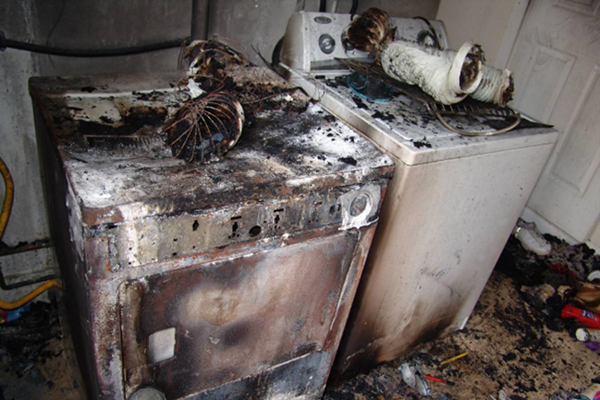Dryer Fire Prevention and Investigation: Causes, Risks, and Safety Measures

Dryer fires pose a substantial risk to both residential and commercial properties, often leading to extensive damage and safety threats. This blog explores dryer fire prevention and investigation, emphasizing the importance of understanding common causes and effective preventive measures. Improper installation and maintenance are primary contributors to dryer fires.
Homeowners frequently attempt to install dryers themselves, resulting in wiring mistakes that can energize neutral conductors and ignite fires in crawl spaces or void areas. Professional installation and adherence to building codes are essential to prevent these hazardous situations.
Preventing and Investigating Dryer Fires
How Dryers Operate and Common Hazards
Dryers, whether electric or gas, operate by generating heat and circulating air to dry clothes. Electric dryers use a 240-volt circuit, while gas dryers use a 110-volt circuit with natural gas or propane. Key components include a drum, belt drive, motor, and heat source.
Despite their simplicity, dryers can become fire hazards due to lint buildup, mechanical failures, and electrical issues. Regular maintenance, such as cleaning the lint filter and ensuring proper ventilation, is essential to prevent fires.
Fire Investigation Process and NFPA 921 Standards
When a dryer fire occurs, a systematic investigation is necessary to determine the cause. Fire investigators follow the scientific method outlined in NFPA 921 to collect data, develop hypotheses, and test them. This process involves examining the fire scene, interviewing witnesses, and analyzing physical evidence.
Key areas of focus include the condition of the dryer, electrical wiring, and any recent maintenance or installation activities. Identifying the exact cause of the fire is crucial for insurance claims and potential subrogation efforts.
Parties Involved in Dryer Fire Investigations
Multiple parties may be involved in the investigation, including the property owner, appliance manufacturer, and contractors who performed installation or maintenance work. Early involvement of experts, such as electrical and mechanical engineers, can provide valuable insights and help preserve critical evidence.
Coordination among all parties ensures a comprehensive investigation and minimizes the risk of evidence spoliation. Proper documentation and preservation of the fire scene are vital to support any legal or insurance-related proceedings.
Role of Insurance Adjusters
Insurance adjusters play a pivotal role in managing dryer fire claims. They must balance investigation costs and potential subrogation with the size of the loss. Quick action to secure the scene, retain experts, and notify all interested parties is essential.
Adjusters should gather all relevant documentation, such as sales receipts, maintenance records, and fire department reports, to support the investigation. Effective communication with the insured and other stakeholders streamlines the process and ensures a thorough examination of the incident.
Preventing Dryer Fires: Key Risk Factors and Safety Measures
Lint Buildup and Ventilation Issues
Lint buildup is a common cause of dryer fires. It can obstruct airflow in the dryer vent and exhaust system, leading to overheating of the heating element. Regular cleaning of the lint trap and dryer vent is essential to maintain proper airflow and prevent fires.
Homeowners should ensure good air movement in the dryer vent and check that the vent hose is not kinked. Professional dryer cleanout services are beneficial, especially in commercial settings where maintenance records are crucial.
Spontaneous Ignition of Oily Rags
Spontaneous ignition of materials soaked with oils or stains is another risk factor. Rags used for cleaning or staining can retain oils even after washing, and the heat from drying can cause them to ignite.
Dispose of such rags in approved metal containers with closed lids rather than reusing them. This precaution is particularly important in commercial environments like restaurants or cleaning businesses, where large quantities of oily rags are common.
Mechanical Failures and Component Risks
Mechanical failures within the dryer, such as issues with the blower exhaust or drum motor, can also lead to fires. Regular maintenance and inspections can identify and address these problems before they escalate.
Lab analysis of dryer components can pinpoint the exact cause of a fire, whether it be bearing failure or friction heating due to trapped materials. Understanding the mechanical aspects of dryers and conducting thorough investigations can prevent future incidents.
Hidden Hazards: Batteries and Pocket Items
Items left in pockets, such as e-cigarettes, vape devices, or lithium batteries, can pose a fire hazard when subjected to the heat of the dryer. These items can cause small explosions and fires, underscoring the importance of checking pockets before washing and drying clothes. Security videos and detailed interviews with occupants can help identify the presence of such items and prevent similar occurrences.
Reducing Dryer Fire Risks Through Prevention and Investigation
Dryer fires pose a significant risk that can be mitigated through proper maintenance and systematic investigation. Understanding dryer operation, recognizing hazards, and following fire investigation guidelines are crucial.
Collaboration among property owners, insurance adjusters, and fire investigators determines causes, prevents future fires, and ensures fair insurance resolutions.
Proper installation, regular maintenance, and careful handling of materials are essential for prevention. Prioritizing these practices and proactive measures significantly reduces dryer fire risks.
Partner with Envista Forensics for Fire Origin and Cause Investigations
When a dryer fire occurs, identifying the true cause is critical for property owners, insurers, and legal teams. At Envista Forensics, our experts specialize in fire origin and cause investigations, combining deep technical knowledge with forensic precision.
Our team of electrical and mechanical engineers work alongside fire investigators to uncover the root causes of dryer fires, whether they involve electrical faults, mechanical failures, or external contributing factors.
We assist insurers, adjusters, and property owners by providing clear, evidence-based findings that support claims, subrogation opportunities, and risk mitigation strategies. From scene preservation to lab analysis, our investigators deliver the insights necessary to resolve complex fire cases with confidence.
Contact Envista Forensics today to learn how our fire investigation experts can help reduce risks, support claims, and protect your clients and properties.
Nuestros consultores están listos para ayudar.


